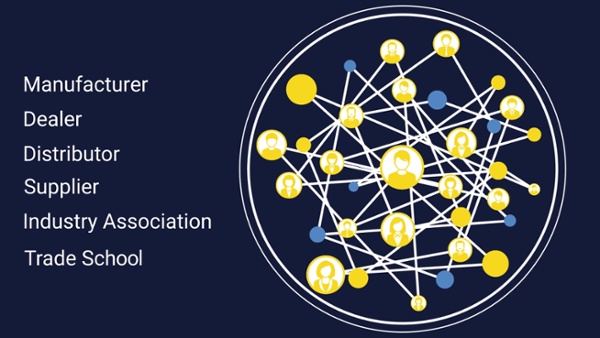“Shared cloud ecosystem” could easily be mistaken as one of any number of buzzwords relating to “the cloud” and various online computing initiatives. In our view, however, shared clouds are truly the future – because of the impact they will have, and are currently having, upon industrial operations. The day will come, very soon, that shared clouds will be seen as a cornerstone of Industry 4.0.
Sound outrageous? Not particularly. Industry may have taken its time embracing modern online technologies, but now advances are coming quickly in all areas of industrial business – including aftermarket support and their associated field operations. Shared cloud systems won’t merely benefit you and your direct partners; they can also significantly improve service response while lowering your post-sale operating costs.
Three Ways That Shared Cloud Ecosystems Are Changing The State Of Aftermarket Support
1. Better-informed field techs
For decades – or centuries – if a piece of equipment was having trouble, all you could do was send out a repair expert to poke around and try to find the trouble. That paradigm is quickly falling by the wayside.
Thanks to modern automation systems, most industrial machinery is coming to be absolutely covered in “smart” Internet-connected sensors monitoring every aspect of its behavior. When piped into a shared cloud, that data can be accessed by field technicians – allowing them to examine or diagnose the machinery remotely! They could already have a good idea about the problem, before even stepping foot on-site, allowing them to fix the issue with unprecedented speed and efficiency.
They might even notice a few other irregularities in the data, and be able to address them before major problems occurred.
2. Increased reliance on skilled freelancers and other independent contractors
Training and maintaining and army of official support reps can be an extremely expensive undertaking. But what if there were a better way?
If all the technical support data for your products is in the cloud, along with the diagnostic information coming from the machinery, there’s far less need to maintain your own service technicians. Utilizing independent contractors becomes far more viable. Obviously, there would still be some level of training and certification involved, but the burdens upon your company would be greatly reduced.
In the meantime, jobs could be doled out to contractors based on an Uber-style model, with priority given to workers who are nearest to the job. This further reduces response times for service calls, potentially saving your customers a lot of money if mission-critical hardware is down.
3. Easier expansion into global markets
Now, take those previous points to the next level: How much easier would it be to expand your operations into Europe, or Asia, or Africa, or anywhere else, if you weren’t looking at the gigantic cost of maintaining service centers overseas?
Shared cloud ecosystems could connect you to overseas technical training schools, putting you in direct contact with the best technicians available. Training materials can be provided electronically, complete with online digital certification. Once certified and verified, these overseas contractors can become your main technical support army, with the need for only minimal physical presence within the country.
(And potentially avoiding a lot of bureaucracy, taxes, and/or bribes in the process!)
Moving Into The Future Of Shared Digital Ecosystems
LogicBay has spent years developing systems that helped indirect sale ecosystems organize and manage themselves with the same efficiency and flexibility as monolithic direct-sale entities. Now, we’re once again moving into the future with FUSE - a member-based, unified digital ecosystem platform which enables businesses of any size, in any field, to leverage the benefits of shared cloud ecosystems.
To learn more about FUSE, click here.

